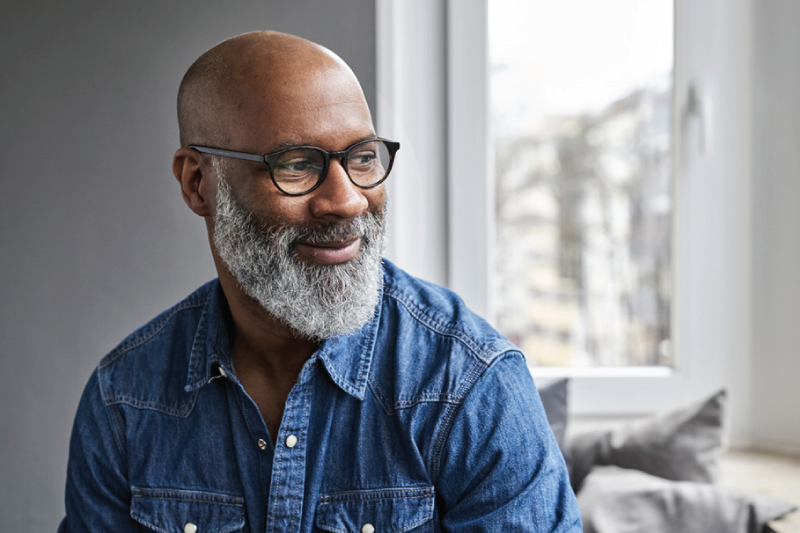Men’s mental health during cancer and beyond
Encouraging men to get support
If you think of testicular or prostate cancer when someone mentions ‘male cancer’, you wouldn’t be alone. While these are cancers that only affect men, men are more likely than women to be diagnosed with — and die from — the most common cancers: prostate, bowel, skin, and lung.1
Men are also less likely to talk about cancer or seek help early, which can increase their risk.
Male cancer outcomes
We know that men who have been diagnosed with cancer don’t fare as well as women:2,3
Other risk factors include:
- they have around 4.5 years’ shorter life expectancy
- they have poorer health in the last 10 years of life
- they have a lower chance than women of being alive five years after diagnosis (~73 % of women compared to ~70 % of men).
And the differences don’t end there. More men than women are diagnosed with, and die from, cancer each year.4 We know that one in two men will be diagnosed with cancer before the age of 85.5
In general, men have a higher number of risk factors which, when addressed, can positively impact or prevent many cancers. Risk factors include:2,6
- tobacco use
- alcohol consumption
- poor diet
- obesity
- low levels of physical activity
- high exposure to workplace chemicals
The good news is these numbers are decreasing, most likely because we have better cancer prevention and screening tools, and treatments for cancer have improved.
Men [often] feel there is a stigma attached to their diagnosis — making it difficult for them to talk about their experience and tackle some of the mental and emotional impacts of those side effects.
Let's talk
Commonly, men don’t go to the doctor and often avoid talking about changes in their body with others. One of the most important things we can do is start conversations between men about their health.
Men who have been diagnosed with cancer often feel a range of emotions — from sadness to anger, fear, and vulnerability — and some are at an increased risk of suicide.
In a study of nearly 15,000 men and women, cancer was associated with elevated anxiety levels in men, as well as a lifetime diagnosis of depression and other psychosocial impacts.7 A separate study in the United States found that among more than 8.5 million cancer patients, 13,311 died by suicide — 83% of whom were male.8
For men, although a cancer diagnosis happens, on average, later in life, older men may be confronted with a disruption in family and work roles, and the sense of purpose and meaning attached to those. In addition, for example, in prostate cancer there is a very high survival rate, but the side effects of the treatment and the cancer itself (including impotence, incontinence, and bowel problems) often mean that men feel there is a stigma attached to their diagnosis — making it difficult for them to talk about their experience and tackle some of the mental and emotional impacts of those side effects.9
Further research shows that one in five men with prostate cancer experience long-term anxiety and depression, but sadly, 72% of those men affected by prostate-related mental health issues do not seek help.10
Supporting men through cancer and beyond
Further work needs to be done to normalise the fact that being diagnosed with cancer is a major, life-changing event — regardless of gender or whether the prognosis is good. We need to explore ways to better empower male cancer patients and health professionals to recognise the less obvious signs of emotional distress and reach out for support. In addition, broader approaches beyond traditional talk therapies are needed — approaches that recognise men’s preference for more active forms of support.
If you or someone you know is struggling with the impact of a cancer diagnosis, please reach out for support.
Cancer Council provides a free, confidential helpline (13 11 20) run by health professionals. They also offer a peer support service called Cancer Connect.
Prostate Cancer Foundation of Australia: 1800 22 00 99 — for support specifically related to prostate cancer.
MensLine Australia: 1300 789 978.
- Australian Institute of Health and Welfare. (2024, July 2). Cancer. Australian Government. Retrieved November 2025, from https://www.aihw.gov.au/
- Cancer Council NSW. (2021, June 14). Men’s health is not just about prostates and testicles. Cancer Council NSW. Retrieved November 2025, from https://www.cancercouncil.com.au/
- National Cancer Control Indicators. (2022, September 29). 5-year survival from diagnosis. Cancer Australia. Retrieved November 2025, from https://ncci.canceraustralia.gov.au/
- Cancer Australia. (2025, October 21). Cancer in Australia statistics. Australian Government. Retrieved November 2025, from https://www.canceraustralia.gov.au/
- Australian Government. Australian Institute of Health and Welfare. Cancer data in Australia. [last updated: 8 October 2025]. https://www.aihw.gov.au/ (accessed November 2025).
- Kumar, V., Sharma, N., Sharma, P., Pasrija, R., Kaur, K., Umesh, M., & Thazeem, B. (2023). Toxicity analysis of endocrine disrupting pesticides on non-target organisms: A critical analysis on toxicity mechanisms. Toxicology and Applied Pharmacology, 474, 116623. https://doi.org/10.1016/j.taap.2023.116623
- Ernst, M., Brähler, E., Klein, E. M., Jünger, C., Wild, P. S., Faller, H., Tibubos, A. N., & Beutel, M. E. (2019). Socioeconomic status, social support, and mental health in a German population sample: Results from the Gutenberg Health Study. Journal of Psychosomatic Research, 124, 109760. https://doi.org/10.1016/j.jpsychores.2019.109760
- Zaorsky, N. G., Zhang, Y., Tuanquin, L., Bluethmann, S. M., Park, H. S., & Chinchilli, V. M. (2019). Suicide among cancer patients. Nature Communications, 10(1), Article 207. https://doi.org/10.1038/s41467-018-08170-1
- Buote, R., Cameron, E., Collins, R., & McGowan, E. (2020). Understanding men’s experiences with prostate cancer stigma: A qualitative study. Oncology Nursing Forum, 47(5), 577–585. https://doi.org/10.1188/20.ONF.577-585
- Duarte, V., Araújo, N., Lopes, C., Costa, A., Ferreira, A., Carneiro, F., Oliveira, J., Braga, I., Morais, S., Pacheco-Figueiredo, L., Ruano, L., Tedim Cruz, V., Pereira, S., & Lunet, N. (2022). Anxiety and depression in patients with prostate cancer, at cancer diagnosis and after a one-year follow-up. International Journal of Environmental Research and Public Health, 19(15), Article 9122. https://doi.org/10.3390/ijerph19159122




